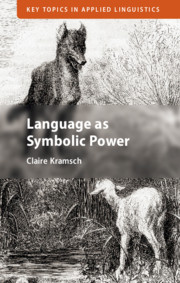Book contents
- Language as Symbolic Power
- Key Topics in Applied Linguistics
- Language as Symbolic Power
- Copyright page
- Contents
- Figures
- Acknowledgments
- Introduction
- Part I The Power of Symbolic Representation
- Part II The Power of Symbolic Action
- Part III The Power to Create Symbolic Reality
- 7 “I Am Seen and Talked About, Therefore I Am”
- 8 Language as Symbolic Power in the Digital Age
- 9 Engaging with Symbolic Power—Responding to Symbolic Violence
- Conclusion
- Glossary
- Endnotes
- References
- Index
9 - Engaging with Symbolic Power—Responding to Symbolic Violence
from Part III - The Power to Create Symbolic Reality
Published online by Cambridge University Press: 15 October 2020
- Language as Symbolic Power
- Key Topics in Applied Linguistics
- Language as Symbolic Power
- Copyright page
- Contents
- Figures
- Acknowledgments
- Introduction
- Part I The Power of Symbolic Representation
- Part II The Power of Symbolic Action
- Part III The Power to Create Symbolic Reality
- 7 “I Am Seen and Talked About, Therefore I Am”
- 8 Language as Symbolic Power in the Digital Age
- 9 Engaging with Symbolic Power—Responding to Symbolic Violence
- Conclusion
- Glossary
- Endnotes
- References
- Index
Summary
If digital technology requires us to completely rethink the fundamental axes of our human existence: time, space and causality, we have to ask the following questions: How are we to conceive of these three axes today when studying and teaching languages as a human activity? How can learning another language help us better understand the symbolic complexity of the human condition? And how can it enable us to engage with symbolic power and respond to symbolic violence? I discuss six scholars that have responded to these questions in recent decades: Judith Butler and her reflections on the time-bound political promise of the performative; Michel de Certeau and his thoughts on the space of strategies and tactics in everyday life; Mikhail Bakhtin on the time/space chronotope and the carnivalesque; Pierre Bourdieu and his Pascalian meditations on causality and the habitus; Alastair Pennycook and Bruno Latour on post-humanist thinking.
Keywords
- Type
- Chapter
- Information
- Language as Symbolic Power , pp. 174 - 194Publisher: Cambridge University PressPrint publication year: 2020

